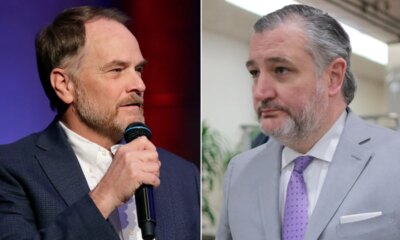World
Colombian ex-President Uribe charged in witness tampering case

Former Colombian President Álvaro Uribe was charged Friday in a long-running witness tampering investigation.
Uribe was formally charged with witness tampering and bribery for his efforts to discredit a political opponent who was digging into Uribe’s family ties to right-wing paramilitary groups. If convicted, Uribe faces up to 12 years in prison.
The case dates back to 2012, when Uribe filed a complaint with the Supreme Court accusing a leftist lawmaker, Iván Cepeda, of slander. In 2018, the high court — the only authority allowed to investigate lawmakers — closed the investigation against Cepeda, and in a bombshell reversal, announced it was opening a new probe into Uribe, who was then a senator for fraud and manipulating testimony.
ATTACK ON POLICE STATION IN COLOMBIA LEAVES 2 OFFICERS DEAD, BOMB BLAST INJURES 6 OTHERS
Uribe, who governed Colombia with strong U.S. support from 2002 to 2010, has denied any wrongdoing and has accused Colombia’s chief prosecutor’s office of “political vengeance.”
There are wiretapped phone conversations in which the former president can be heard discussing with one of his lawyers efforts to flip two former paramilitary fighters who were set to testify against him. Uribe said his conversations were intercepted illegally.
FILE – Former President Álvaro Uribe arrives for a press conference at the Democratic Center party headquarters, in Bogotá, Colombia, June 29, 2022. On Friday, May 24, 2024, Uribe was formally charged with witness tampering and bribery for his efforts to discredit a political opponent who was digging into his family ties to right-wing paramilitary groups. (AP Photo/Lina Gasca, File)
The long-running legal battle is taking place against a polarized political backdrop in the South American nation that has been made more intense by the 2022 election of another Uribe critic, President Gustavo Petro, a former leftist rebel himself.
No political leader in Colombia’s recent history has wielded as much influence as Uribe, who still has legions of followers. He led the “no” campaign that successfully voted against a peace accord with leftist rebels in 2016, though the government later adopted a slightly revised version.
Allegations of ties to drug cartels and paramilitaries have dogged him since the early 1980s, when the civil aviation agency he then led was accused of giving air licenses to drug traffickers. Declassified State Department cables from a decade later show U.S. officials were told the up-and-coming politician had ties to cartels.
The media attention and strong emotions surrounding the case have complicated the work of Colombia’s justice system, which throughout its history has struggled to hold prominent political and military leaders accountable.
Before Petro took office, Colombian prosecutors tried twice to close the witness-tempering case after saying they had failed to find evidence of Uribe’s criminal responsibility. However, those requests were rejected by judges, and in April, after Petro appointed a new attorney general, prosecutors changed course and said they would take the case to trial.
Friday’s hearing was held through video conference and Uribe had a limited role, leaving most of the talking to his lawyer.
The chief prosecutor, Gilberto Ivan Villareal, said the former president “abused his distinguished position in society” to flip witnesses and get them to speak out against Cepeda.
Uribe was briefly held under pre-trial house arrest in 2020 during the coronavirus pandemic under orders from the Supreme Court. But he was freed shortly after resigning his senate seat. The move prompted the justice system to transfer the case from the high court to prosecutors.

World
Trump's national security team comes to convince Congress to back Iran war

World
Iran’s senior clerics ‘exposed’ after building strike in Qom, succession choice looms

NEWYou can now listen to Fox News articles!
Senior Iranian clerics would have been left “exposed” after an Israeli airstrike hit a meeting place where they were supposed to be convening Tuesday — days after a strike leveled the Tehran compound of Supreme Leader Ayatollah Ali Khamenei, a defense analyst has claimed.
The clerics, members of the Assembly of Experts, had reportedly planned to meet at the location in Qom to deliberate succession plans for Khamenei, who was killed in the strikes, according to The Times of Israel.
“This second strike would be another embarrassment to what has been left of the regime,” Kobi Michael, a senior researcher at the Institute for National Security Studies and the Misgav Institute, told Fox News Digital.
“It indicates intelligence dominance and superiority because any movement is detected, meaning they would feel exposed,” Michael added.
Iranian Supreme Leader Ayatollah Ali Khamenei was killed in an Israeli airstrike Saturday. (Getty Images)
“As of now, the leadership would feel insecure and hunted, with all of their plans collapsing one after another.”
“They would feel totally isolated and understand that the biggest risk might come from home — from a potential uprising next,” he added.
Israel Defense Forces spokesman Brig. Gen. Effie Defrin confirmed that the Israeli Air Force struck the building where senior clerics had planned to assemble, The Times of Israel reported.
KHAMENEI’S DEATH OPENS UNCERTAIN CHAPTER FOR IRAN’S ENTRENCHED THEOCRACY
A general view of Tehran with smoke visible in the distance after explosions were reported in the city, Monday, in Iran. (Contributor/Getty Images)
It remains unclear how many of the 88 members were present at the time of the strike, according to an Israeli defense source cited by the outlet. The second strike on Iran’s leadership comes amid a broader military campaign.
As previously reported by Fox News Digital, U.S. forces have struck more than 1,700 targets across Iran in the first 72 hours of Operation Epic Fury, according to a U.S. Central Command fact sheet.
The campaign is aimed at dismantling Iran’s security apparatus and neutralizing what officials describe as imminent threats.
According to U.S. Central Command, targets have included command-and-control centers, the Islamic Revolutionary Guard Corps Joint Headquarters, the IRGC Aerospace Forces headquarters, integrated air defense systems and ballistic missile sites.
FIREBRAND ANTI-AMERICAN CLERIC ALIREZA ARAFI SEEN AS CONTENDER TO REPLACE IRAN’S KHAMENEI
The USS Thomas Hudner fires a Tomahawk land attack missile in support of Operation Epic Fury, Sunday, while at sea. (U.S. Navy/via Getty Images)
“We need strategic patience and determination, and in several weeks most of the job will be accomplished,” Michael added. “Even if the regime does not collapse, Iran will not be like we used to know.
CLICK HERE TO DOWNLOAD THE FOX NEWS APP
“I assume that the U.S. and Israel will establish a very robust monitoring mechanism that will enable them to react whenever the regime tries to reconstitute its military capacities again.”
World
Hungarian veto proves EU needs less unanimity, says new Dutch PM

Hungary’s last-minute veto on the €90 billion loan to Ukraine highlights the need for the European Union to move away from unanimity, Rob Jetten, the new prime minister of the Netherlands, said on his first trip to Brussels since taking office.
ADVERTISEMENT
ADVERTISEMENT
“The new Dutch goverment is in favour of less and less decision-making by unanimity on the European level,” Jetten told a group of media, including Euronews, on Tuesday.
“This is a clear example of why that is important because we cannot explain to our constituents that Europe is sometimes way too level in reacting to great issues that affect us all,” he added.
Jetten called on his Hungarian counterpart, Viktor Orbán, to abide by the delicate deal that the 27 EU leaders reached in December after fraught negotiations. The compromise saw Hungary, Slovakia and the Czech Republic promising the necessary unanimity to amend the EU budget rules in exchange for being exempted from the joint borrowing.
Officials and diplomats in Brussels believe that by vetoing a critical piece of the loan at the last stage of the legislative process, Orbán has breached the principle of sincere cooperation that binds the bloc’s decision-making.
“If you reach political agreement on the Council level, we expect every member state to uphold that agreement. And if not, it’s a big task for the European Commission take action,” Jetten said.
In the new coalition programme, the Netherlands calls for the “simplification” of the Article 7 procedure that can deprive member states of voting rights when they commit grave violations of the rule of law. Hungary has been under Article 7 for years, but there has never been sufficient political momentum to move to the harder enforcement phase.
“It is absolutely necessary that we support Ukraine in the months to come to make sure they can continue their fight against Russian aggression,” Jetten went on.
“With less and less American support for the Ukrainians in terms of money and weapons, it is up to the Europeans to deliver.”
Orbán’s veto centres on the interruption of Russian oil supplies through the Druzhba pipeline, which Kyiv says was attacked by Russian drones on 27 January and has remained non-operational since then.
But Orbán says Ukrainian President Volodymyr Zelenskyy has deliberately shut down the pipeline for “political reasons” to influence the results of the upcoming Hungarian elections. Orbán trails in opinion polls by double digits.
Caught between the two rival camps, the European Commission has asked Zelenskyy to repair Druzhba and Orbán to lift his veto. Meanwhile, Hungary and Slovakia have proposed a fact-finding mission to inspect the damaged section of the pipeline.
“We expect the European Commission to solve this issue,” Jetten said. “If it’s helpful to have any fact-finding missions on the pipeline to fix this issue, I’m open to it. But everything begins with: a political agreement at the Council level is a political agreement.”
‘Too early’ for a date on Ukraine’s accession
Among the first debates facing Jetten as premier is the future of enlargement, a topic on which the Netherlands has expressed well-known reservations in the past.
Zelenskyy is advocating for a specific date for Ukraine’s accession to be enshrined in a prospective peace deal, something that could offset the pain of territorial concessions. Last week, he openly suggested 2027 as an aspirational benchmark.
The Commission says it cannot commit to a clear-cut date but is working on legal avenues to revamp the notoriously complex process and ensure the Ukrainian people have greater certainty in their path to membership.
Asked about the potential reform, Jetten said enlargement should be reconsidered from a “geopolitical perspective” but urged the bloc to be “careful” with next steps, warning that the essence of the European project risks being undermined.
“We are very open-minded to look into broader support for these (candidate) countries, but moving too fast is not the way to move forward,” the premier said.
“I think, at the moment, it’s not possible to set a date for enlargement with Ukraine, but it is possible to talk with them, and I will do that with President Zelenskyy, (about) how Europeans can support Ukraine in the important reforms that they have undertaken. But at this moment, it is too early to set the date.”
Jetten also touched upon the US-Iranian strikes on Iran, which have pushed the Middle East into uncharted territory. Wholesale gas prices have soared in reaction to the war, prompting fears that Europe might soon face a prohibitive bill to refill its underground reserves, which are running low after the heating season.
“Obviously, the Iran war can have a big impact on strategic reserves, not only in Europe but also in Asia. So we have to prepare ourselves for any case that this war will continue for many more weeks and impact the strategic reserves in the Netherlands and abroad,” he said, noting extra measures would be taken “if necessary”.
“I think the broader concern is what this war and everything that’s going on in the Strait of Hormuz is going to affect in terms of pricing.”
‘The Netherlands is back’
Jetten’s D66 party has formed a minority goverment with the liberal VVD and the conservative CDA, all of which support European integration. His tenure puts an end to the fractious four-party coalition headed by the right-wing, Eurosceptic Party for Freedom (VVD) of Geert Wilders, which was marked by constant disagreements.
Among the priorities, his executive has pledged to ramp up defence spending, simplify regulation, promote new technologies and expand renewable energy.
“As a founding (member) and the fifth (largest) economy within the EU, the Netherlands is back at the table to work closely together with everyone here in Brussels and our allies within the EU,” Jetten said.
“We see a lot of opportunities to strengthen the European economy and competitiveness, and also to make sure that we do our job with a lot of tax-based money to invest in the European defence and the European defence industry.”
Jetten and the other 26 leaders are heading for a no-holds-barred fight on the next Multiannual Financial Framework (MFF), the bloc’s seven-year budget. Brussels has proposed a €2-trillion template that some capitals consider politically unpalatable.
Where to cut spending will be a major fracture line. Germany, the Nordics and the Baltics want a greater focus on strategic priorities, while Spain, Italy and Eastern Europe want to preserve the prominence of agriculture and cohesion funds.
The Dutch premier made it clear that the next budget should focus on the big transitions shaping the continent’s future: defence, technology and climate.
“A modern MFF doesn’t mean an exploded MFF in terms of numbers,” he said.
“The Netherlands will look into the numbers very closely, and we will have a lot of debate on this topic in the months to come.”
-

 World6 days ago
World6 days agoExclusive: DeepSeek withholds latest AI model from US chipmakers including Nvidia, sources say
-

 Massachusetts7 days ago
Massachusetts7 days agoMother and daughter injured in Taunton house explosion
-

 Denver, CO7 days ago
Denver, CO7 days ago10 acres charred, 5 injured in Thornton grass fire, evacuation orders lifted
-

 Louisiana1 week ago
Louisiana1 week agoWildfire near Gum Swamp Road in Livingston Parish now under control; more than 200 acres burned
-

 Oregon5 days ago
Oregon5 days ago2026 OSAA Oregon Wrestling State Championship Results And Brackets – FloWrestling
-

 Florida3 days ago
Florida3 days agoFlorida man rescued after being stuck in shoulder-deep mud for days
-

 Maryland3 days ago
Maryland3 days agoAM showers Sunday in Maryland
-

 Culture1 week ago
Culture1 week agoTry This Quiz on Thrilling Books That Became Popular Movies



















